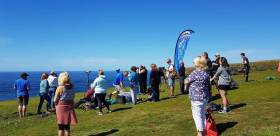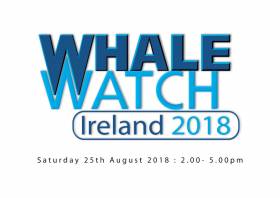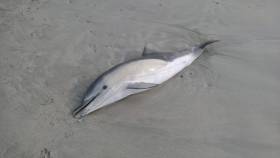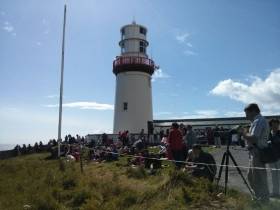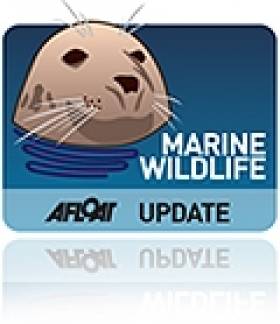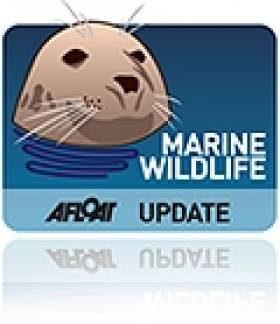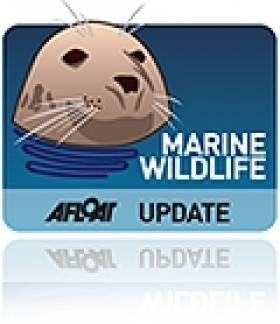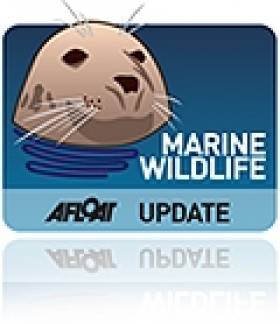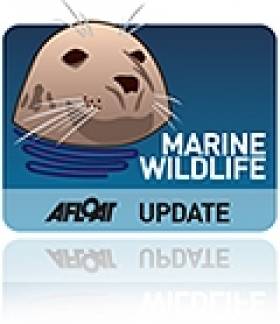Displaying items by tag: Whale Watch Ireland
IWDG Hails Return of Whale Watch Day With More than 500 People Joining In Around the Coast
Despite lower attendance and a reduced sighting rate, the Irish Whale and Dolphin Group (IWDG) says it is “delighted” with the return of its All-Ireland Whale Watch Day last month.
Held on Saturday 20 August during Heritage Week and for the first time since 2019, on account of the COVID pandemic, this year’s event saw an overall decline in attendance (-38% on 2019) and fewer cetacean sightings (33% of sites compared to 58% in 2019).
IWDG sightings officer Pádraig Whooley, who organised the event, suggested that a confluence of factors — from windy conditions on the day to the legacy of the pandemic and even holidays abroad — may have affected the turnout.
In addition, the poor sea state at many watch sites would have affected the sighting rate, with the best results at Clogherhead in Co Louth (two dolphin species and four harbour porpoises) and Howth Head in north Co Dublin (10 harbour porpoises). No whales were recorded at any of the 18 sites.
But some 530 marine wildlife enthusiasts made a day of it around the Irish coast, and Whooley is optimistic about the future of the initiative.
“We hope that among those who attended, there will be some new members and dedicated whale watchers who are willing to volunteer some of their time and energy in furthering our understanding of the whales and dolphins that live in Irish coastal waters,” Whooley said.
“Our challenge, post-pandemic, is to find new and innovative ways to rebuild this important natural history event and so we may explore the potential for moving it to May in 2023 to coincide with Biodiversity Week.”
Whale Watch Ireland 2018: The Results Are In
#MarineWildlife - The Papal visit brought numbers down for 2018’s Whale Watch Ireland last Saturday (25 August).
But some 950 wildlife enthusiasts still came out to 19 sites around the island of Ireland for the chance to spot some of the many whales, dolphins, porpoise and other wildlife in our waters.
Most sites reported a reduction in numbers, with only three seeing a modest increase. But it’s expected that next year’s turnout will be back to it regular size, coinciding as ever with events for Heritage Week.
Sightings were also lower this year — on average a 43% reduction on 2017’s records — with only three cetacean species spotted, namely harbour porpoise (50), common dolphins (40) and minke whales (5).
The success or otherwise of event is generally determined by the prevailing weather on the day, and thankfully most sites were treated to calm seas and clear skies which resulted in cetacean sightings at three-quarters of the sites covered at this year’s event.
Other species noted include grey seals, a basking shark and a sunfish.
Despite the lower attendance and sighting rates, the Irish Whale and Dolphin Group says it is “very pleased” with this year’s results.
“And we hope that among those who attended, there will be some new members for IWDG and dedicated whale watchers who are willing to volunteer some of their time and energy in furthering our understanding of the whales and dolphins that live in Irish coastal waters.”
The IWDG reports that usual there was a mix of both Irish and overseas visitors to the watches, and for many attending this was their first encounter with a cetacean in the wild in Irish waters.
All-Ireland Whale Watch Day Is A Week Away
#MarineWildlife - Ireland’s annual whale watch day takes place next Saturday 25 August — and the Irish Whale and Dolphin Group invites the public to join its land-based whale watches around the island of Ireland.
From 2pm to 5pm next Saturday, the IWDG’s volunteers will be raising awareness of the 25 species of cetaceans — porpoises, dolphins and whales — recorded to date in all Irish waters, and giving the public a great opportunity to look for and observe some of these wonderful marine mammals in their natural environment.
Whale Watch Ireland also provides IWDG researchers with a unique snapshot of whale and dolphin activity around the Irish coast on the day.
This annual, all-island citizen science event, organised by the IWDG in association with Inis the Energy of the Sea, is free and open to all as part of Heritage Week, co-ordinated by The Heritage Council.
All watches are land-based and will be led by experienced IWDG researchers and whale watchers, who will show you how to observe and identify some of the more commonly recorded cetacean species in Irish waters and who will be available to discuss the conservation work of the IWDG.
To make the most of the day, bring binoculars or a spotting scope, and dress appropriately for outdoor weather conditions. There are no boat trips involved and there is no guarantee that you will see whales or dolphins at your chosen site.
But at last year’s event, whales or dolphins were recorded at three-quarters of sites around the Irish coast.
The full list of watching locations, with watch leader contacts, is as follows:
- Clogherhead, Co Louth - Port Oriel Upper Car Park - Breffni Martin 087 9145363/[email protected]
- Howth Head, North Dublin - Balscadden Car Park - Conal O’Flanagan 086 3537900/[email protected]
- Killiney Bay, South Dublin - Vico Road - Meadhbh Quinn 087 2759529/[email protected]
- Bray Head, Co Wicklow - Pitch & Putt Car Park - Justin Ivory 087 6833898/[email protected]
- Wicklow Town - Black Castle Car Park - Brian Glanville 087 1390665/[email protected]
- Hook Head, Co Wexford - Hook Head Lighthouse - Noel Lynch 087 3226656/[email protected]
- Ardmore Head, Co Waterford - Ram Head Signal Tower - Andrew Malcolm 087 7952061/[email protected]
- Galley Head, Co Cork - Lighthouse - Pádraig Whooley 086 3850568/[email protected]
- Valentia Island, Co Kerry - Bray Head Signal Tower - Sean O’Callaghan 085 7764918/[email protected]
- Clogher Head, Co Kerry - Layby - Nick Massett 087 6736341/[email protected]
- Loop Head, Co Clare - Loop Head Lighthouse - Simon Berrow 086 8545450 / [email protected]
- Black Head, Co Clare - Black Head Lighthouse - Sandra O’Donovan 086 6061869 / [email protected]
- Downpatrick Head, Co Mayo - Car Park - Mark Holmes 086 7376369 / [email protected]
- Mullaghmore Head, Co Sligo - Mullaghmore Head - Miriam Crowley 085 8535823 / [email protected]
- Bloody Foreland, Co Donegal - Foreland Heights Car Park - Gareth Doherty 086 2223328 / [email protected]
- Inishowen Head, Co Donegal - Tower - Trish Murphy 087 6748183 / [email protected]
- Portstewart, Co Antrim - Ramore Head - Jim Allen 078 76516032 / [email protected]
- Portmuck, Co Antrim - Car Park - Cathy Hinds 075 11160658 / [email protected]
- Bloody Bridge, Co Down - Car Park - Dave Wall 077 71762355 / [email protected]
IWDG Marks Another ‘Record’ Year For Cetacean Strandings
#MarineWildlife - The Irish Whale and Dolphin Group (IWDG) has expressed its dismay at another record year for cetacean standings around the Irish coast.
The first eight months of 2017 alone have seen 201 recorded strandings - up 30% compared to the same period in the last two years.
“As in recent years, the numbers of dead common dolphins recorded are very high, with 78 records for this species to the end of August 2017 accounting for 39% of all strandings,” says IWDG strandings officer Mick O’Connell, who notes that the numbers of dead dolphins washing ashore in late winter and spring has grown unusually high.
“Even in a series of years with particularly high numbers of this species stranding since 2011, 2017 is well ahead of the previous two ‘record’ years by the end of August — 66 in 2016 and 53 in 2013.
“These are, of course, minimum numbers as we don't know how many dead animals go unrecorded and also many unidentified dolphins which aren't identifiable to species level are likely to be common dolphins,” he adds.
The IWDG is currently working with the Marine Institute, Department of Agriculture and National Parks and Wildlife service on a post-mortem scheme for common dolphins, striped dolphins and harbour porpoises which is hoped will shed new light on what might be causing this alarming rise in cetacean deaths.
Meanwhile, there was more positive news from the recent all-Ireland whale watch at the end of August, where three-quarters of the 20 sites around the island recorded sightings.
Around 1,300 whale watchers and wildlife enthusiasts spotted eight species of cetacean between them — with the busiest site at Loop Head in Co Kerry, where 120 lucky visitors got to see two humpback whales, five minke whales, six bottlenose and a whopping 50 common dolphins.
Other marine wildlife species spotted around the coast included Risso’s dolphins, blue fin tuna, ocean sunfish and grey seals.
More recently, the IWDG’s Celtic Mist embarked on a week-long survey of the waters around North and West Kerry, and its crew shared a video of some of their sightings.
Save The Date For 2016 All Island Whale Watch Day
#WhaleWatchDay - The 2016 All Island Whale Watch Day takes place on Saturday 27 August as part of Heritage Week.
All are invited to join the Irish Whale and Dolphin Group (IWDG) at any of 20 land-based whale watches on headlands around the Irish coast from 2pm-5pm on the day.
The purpose of Whale Watch Ireland is to raise awareness of the 25 species of cetaceans – whales, dolphins and porpoises – recorded to date in Irish waters, by providing the opportunity to see them in their natural environment.
The event also provides IWDG researchers with a unique snapshot of cetacean activity off the Irish coast.
Though sightings can't be guaranteed, the early arrival of humpback whales among others this year is surely a good omen, especially for those along the south coast between West Cork and Wexford.
And with three-quarters of sites reporting whale or dolphin sightings on last year's Whale Watch Day, the odds are good for next month.
No prior experience is necessary as IWDG volunteers will be on hand to show you how to observe our biggest marine wildlife.
Anyone who wants to come out on the day should bring binoculars or a spotting scope, and dress appropriately for what can be very changeable outdoor conditions.
Details of the 20 headland watch sites are listed below; contact the relevant local organiser for more details or if you wish to help out on the day:
- Clogherhead, Co Louth - Port Oriel Upper Car Park - Breffni Martin, 087 914 5363
- Howth Head, North Co Dublin - Balscadden Car Park - Conal O’ Flanagan, 086 353 7900
- Killiney Bay, South Co Dublin - Vico Road - Brian Glanville, 087 139 0665
- Bray Head, Co Wicklow - Pitch & Putt - Justin Ivory, 087 683 3898
- Hook Head, Co Wexford - Lighthouse - Harm Deenen, 086 348 5013
- Ardmore, Co Waterford - Ram Head Signal Tower - Andrew Malcolm, 087 795 2061
- Galley Head, Co Cork - Lighthouse - Pádraig Whooley, 086 385 0568
- Hog’s Head, Co Kerry - Sea Synergy Centre, Waterville - Lucy Hunt, 087 785 0929
- Valentia Island, Co Kerry - Bray Head Signal Tower - Sean O’Callaghan, 085 776 4918
- Clogher Head, Co Kerry - Lay-by - Nick Massett, 087 673 6341
- Loop Head, Co Clare - Lighthouse - Simon Berrow, 086 854 5450
- Black Head, North Co Clare - Lighthouse - Sandra O’Donovan, 086 606 1869
- Downpatrick Head, Co Mayo - Car park - Aoife Foley, 085 827 6984
- Mullaghmore Head, Co Sligo - Lay-by - Miriam Crowley, 087 617 1377
- Bloody Foreland, Co Donegal - Heights Bar car park - Gareth Doherty, 086 222 3328
- Malin Head, Co Donegal - Signal Tower - Ronan McLaughlin, 086 389 3154
- Ramore Head, Co Antrim - Portrush Coastal Zone - Jim Allen, 078 765 16032
- Portmuck, Co Antrim - Car park - Ian Enlander, 028 933 72724
- Bloody Bridge, Co Down - Car park - Dave Wall, 077 717 62355
Whale Watch Ireland 2014: The Results Are In
#MarineWildlife - Though the 'washout' weather decreased numbers attending this year's Whale Watch Ireland last Sunday 24 August, nearly half of all events that went ahead reported sightings – with two-thirds of these seeing cetaceans.
Sadly there were no whales spotted this time out, but big numbers of harbour porpoise wherever they showed hopefully proved some consolation.
Common and bottlenose dolphins were also sighted at a number of sites, as were other marine wildlife such as basking sharks, grey seals and the rare treat of an ocean sunfish.
The Irish Whale and Dolphin Group has more on the story HERE.
Hundreds Brave The Elements For 'Washout' Whale Watch Ireland
#MarineWildlife - Though the weekend's miserable wintry weather made this year's Whale Watch Ireland something of a 'washout', according to TheJournal.ie, for those who did turn out there was a good chance of seeing some of our bountiful marine wildlife in action.
Despite a number of the 20 organised events being cancelled, it's thought that some 1,500 people still braved the elements on Sunday afternoon (24 August) and had more than a 50 per cent chance of seeing a whale, dolphin or porpoise off Ireland's coast.
Irish Whale and Dolphin Group (IWDG) sightings officer Pádraig Whooley says the results of this year's nationwide whale watch are still being collated.
But it's already on record that Ireland is one of the vest places on earth for the pastime.
As the Sunday Independent reports, the numbers of humpback whales visiting our waters are estimated at nearly 300 out of a global population of 80,000, following a record summer for sightings off Ireland.
And as previously reported on Afloat.ie, Ireland is now considered "one of the best locations in the northern hemisphere" to film cetaceans in action.
Whale Watch Ireland Is Coming This Sunday
#WhaleWatch - All are are invited to join the Irish Whale and Dolphin Group (IWDG) on one of its 20 land-based whale watches from headlands around the Irish coast this Sunday 24 August for Whale Watch Ireland 2014.
The purpose of the day is to raise awareness of the 24 species of cetaceans (porpoises, dolphins and whales) that have been recorded around the Irish coast, by giving members of the public an opportunity to observe some of these wonderful marine mammals in their natural environment.
This event also provides IWDG researchers with a unique snapshot of whale and dolphin activity around the entire Irish coast.
By taking part in this annual event, the public is actively supporting whale and dolphin conservation in Ireland and the work of the IWDG.
This annual, all-island event – organised by the IWDG in association with Inis Cologne perfume and taking place during Heritage Week – is free and open to all.
All whale watches are land-based and will be led by experienced IWDG personnel, who will show you how to observe and identify some of the more commonly seen cetacean species seen in Irish waters and will be available to answer any questions you may have on the work of the IWDG.
You should bring binoculars or a spotting scope and dress appropriately for outdoor conditions. There are no boat trips involved, and there are of course no guarantees that you will see whales or dolphins during your particular event.
Details of all 20 whale-watching events and local organisers are included on the IWDG website HERE.
Whale Watch Ireland 2013 - The Results Are In
#WhaleWatch - More than half the sites hosting events for the recent All-Ireland Whale Watch Day saw at least one whale, dolphin or porpoise, according to the Irish Whale and Dolphin Group (IWDG).
Reporting its stats from Whale Watch Ireland 2013 on Sunday 18 August, the IWDG says harbour porpoise, common dolphins and a minke whale were among the sightings nationwide at 16 events attended by a total of almost 1,200 people - a 30% increase on last year.
The best place to be was Galley Head in West Cork, where newbie and veteran whale watchers alike saw the only minke whale of the day, not to mention the largest concentration of common dolphins.
Dolphins were also visible off Downpatrick Head in Mayo despite the poor weather. But it was harbour porpoise that were in plentiful supply in the Dublin area (off Howth Head and in Killiney Bay) and Portmuck in Co Antrim.
As previously reported on Afloat.ie, All-Ireland Whale Watch Day coincided with Ireland's Heritage Week events for 2013.
Whale Watch Day This Sunday Makes Heritage Week List
#MarineWildlife - This Sunday's All-Ireland Whale Watch Day has made the list of The Irish Times' 40 things to do in Heritage Week 2013.
The Irish Whale and Dolphin Group (IWDG) will be hosting free, guided and land-based whale watching events at 16 headlands around the Irish coast from 2pm to 5pm this Sunday 18 August.
The purpose of the day is to raise awareness of the 24 cetacean species recorded in Irish waters by giving the general public the chance to see our whales and dolphins in their natural environment.
And as the group tells RTÉ News, the recent arrival of minke whales in great numbers spells "a good omen" for this Sunday's island-wide watch.
The IWDG has the full list of whale watch spots for this weekend HERE.
Whale Watch Ireland 2013 just one example of the wide range of activities taking place during Heritage Week from 17-25 August.
Other events on the water during the week include Victorian seaside celebrations in Kilkee, Co Clare on 21 August; a river walk along the Lee in Cork city centre on 24 August; lighthouse tours at Galley Head, Loop Head and Wicklow Head on 25 August; and the Galway Hooker festival, Cruinniú na mBád, this weekend 17-18 August.



























